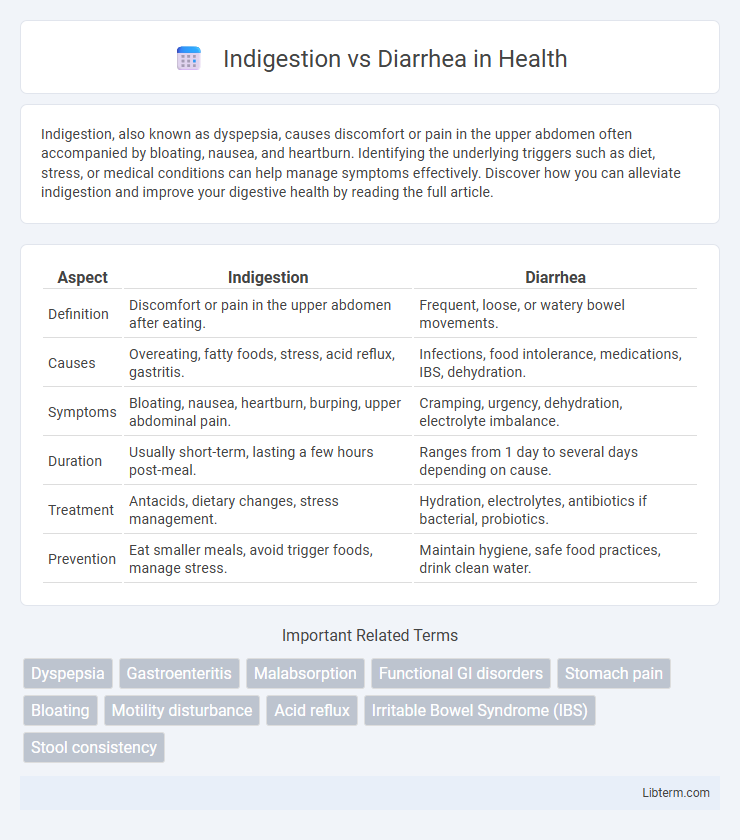Indigestion, also known as dyspepsia, causes discomfort or pain in the upper abdomen often accompanied by bloating, nausea, and heartburn. Identifying the underlying triggers such as diet, stress, or medical conditions can help manage symptoms effectively. Discover how you can alleviate indigestion and improve your digestive health by reading the full article.
Table of Comparison
| Aspect | Indigestion | Diarrhea |
|---|---|---|
| Definition | Discomfort or pain in the upper abdomen after eating. | Frequent, loose, or watery bowel movements. |
| Causes | Overeating, fatty foods, stress, acid reflux, gastritis. | Infections, food intolerance, medications, IBS, dehydration. |
| Symptoms | Bloating, nausea, heartburn, burping, upper abdominal pain. | Cramping, urgency, dehydration, electrolyte imbalance. |
| Duration | Usually short-term, lasting a few hours post-meal. | Ranges from 1 day to several days depending on cause. |
| Treatment | Antacids, dietary changes, stress management. | Hydration, electrolytes, antibiotics if bacterial, probiotics. |
| Prevention | Eat smaller meals, avoid trigger foods, manage stress. | Maintain hygiene, safe food practices, drink clean water. |
Understanding Indigestion and Diarrhea
Indigestion, characterized by upper abdominal discomfort, bloating, and nausea, results from impaired digestion or irritation in the stomach and esophagus. Diarrhea involves frequent, loose, or watery bowel movements caused by infections, food intolerances, or gastrointestinal conditions. Understanding the distinct symptoms and underlying causes of indigestion and diarrhea is essential for accurate diagnosis and effective treatment.
Key Differences Between Indigestion and Diarrhea
Indigestion primarily involves discomfort or pain in the upper abdomen, accompanied by bloating, nausea, and a feeling of fullness after eating, whereas diarrhea is characterized by frequent, loose, or watery bowel movements. Indigestion results from impaired digestion or gastric irritation, while diarrhea stems from rapid intestinal transit or infection affecting water absorption. Treatment for indigestion often includes antacids and dietary changes, contrasting with diarrhea management which focuses on hydration and addressing underlying infections or malabsorption issues.
Common Causes of Indigestion
Indigestion, also known as dyspepsia, commonly results from overeating, consuming fatty or spicy foods, stress, and the use of certain medications such as NSAIDs or antibiotics. Unlike diarrhea, which primarily involves frequent loose stools often caused by infections or food intolerances, indigestion manifests as discomfort or pain in the upper abdomen, bloating, and nausea. Identifying and managing common triggers like dietary habits and stress can effectively reduce symptoms of indigestion.
Typical Triggers of Diarrhea
Typical triggers of diarrhea include viral infections like norovirus and rotavirus, bacterial contamination from foodborne pathogens such as Salmonella and E. coli, and parasitic infections like Giardia lamblia. Dietary factors such as lactose intolerance, excessive intake of artificial sweeteners, and high-fat foods can also provoke diarrhea episodes. Medications including antibiotics, laxatives, and antacids containing magnesium frequently contribute to diarrhea onset by disrupting normal gut flora or gastrointestinal function.
Main Symptoms: Indigestion vs Diarrhea
Indigestion primarily presents with symptoms such as upper abdominal discomfort, bloating, nausea, and a feeling of fullness shortly after eating. Diarrhea is characterized by frequent, loose, or watery stools often accompanied by abdominal cramps, urgency, and sometimes fever or dehydration. Differentiating these symptoms is crucial for accurate diagnosis and appropriate treatment.
Diagnosing Digestive Issues
Indigestion and diarrhea represent distinct digestive disorders requiring precise diagnosis through symptom evaluation and medical testing such as stool analysis or endoscopy. Indigestion is characterized by upper abdominal discomfort, bloating, and nausea, often linked to acid reflux or gastritis, whereas diarrhea involves frequent, watery bowel movements indicative of infections, malabsorption, or inflammatory bowel disease. Accurate differentiation through comprehensive history, physical examination, and laboratory investigations ensures targeted treatment and effective management of underlying causes.
Effective Treatment Options
Indigestion treatment typically involves antacids, proton pump inhibitors, and lifestyle changes such as diet modification and stress reduction to alleviate symptoms like bloating and discomfort. Diarrhea management centers on rehydration therapy with oral rehydration salts, dietary adjustments including a BRAT diet (bananas, rice, applesauce, toast), and sometimes antimotility or antibiotic medications depending on the cause. Both conditions benefit from identifying underlying triggers, maintaining hydration, and consulting healthcare professionals for targeted therapies.
Home Remedies and Self-Care Tips
Indigestion relief can be achieved through simple home remedies such as drinking ginger tea, consuming small, frequent meals, and avoiding spicy or fatty foods to reduce stomach discomfort. For diarrhea, staying hydrated with oral rehydration solutions or electrolyte-rich fluids is crucial, alongside eating bland foods like bananas, rice, applesauce, and toast (BRAT diet) to soothe the digestive tract. Both conditions benefit from adequate rest, avoiding caffeine and alcohol, and monitoring symptoms to prevent complications or the need for medical intervention.
When to Seek Medical Attention
Seek medical attention for indigestion if persistent symptoms last more than two weeks, are accompanied by severe abdominal pain, unexplained weight loss, or vomiting blood. For diarrhea, consult a healthcare provider if it lasts more than two days, contains blood or pus, or is accompanied by high fever, dehydration signs, or severe abdominal cramping. Timely medical evaluation is crucial to diagnose underlying conditions such as infections, gastrointestinal disorders, or more serious diseases.
Preventing Digestive Discomfort
Preventing digestive discomfort involves managing triggers specific to indigestion and diarrhea. For indigestion, avoiding fatty, spicy foods and eating smaller, more frequent meals helps reduce acid build-up and gastric distress. To prevent diarrhea, maintaining hydration, practicing good hand hygiene, and consuming probiotics support gut health and minimize infection risks.
Indigestion Infographic

 libterm.com
libterm.com